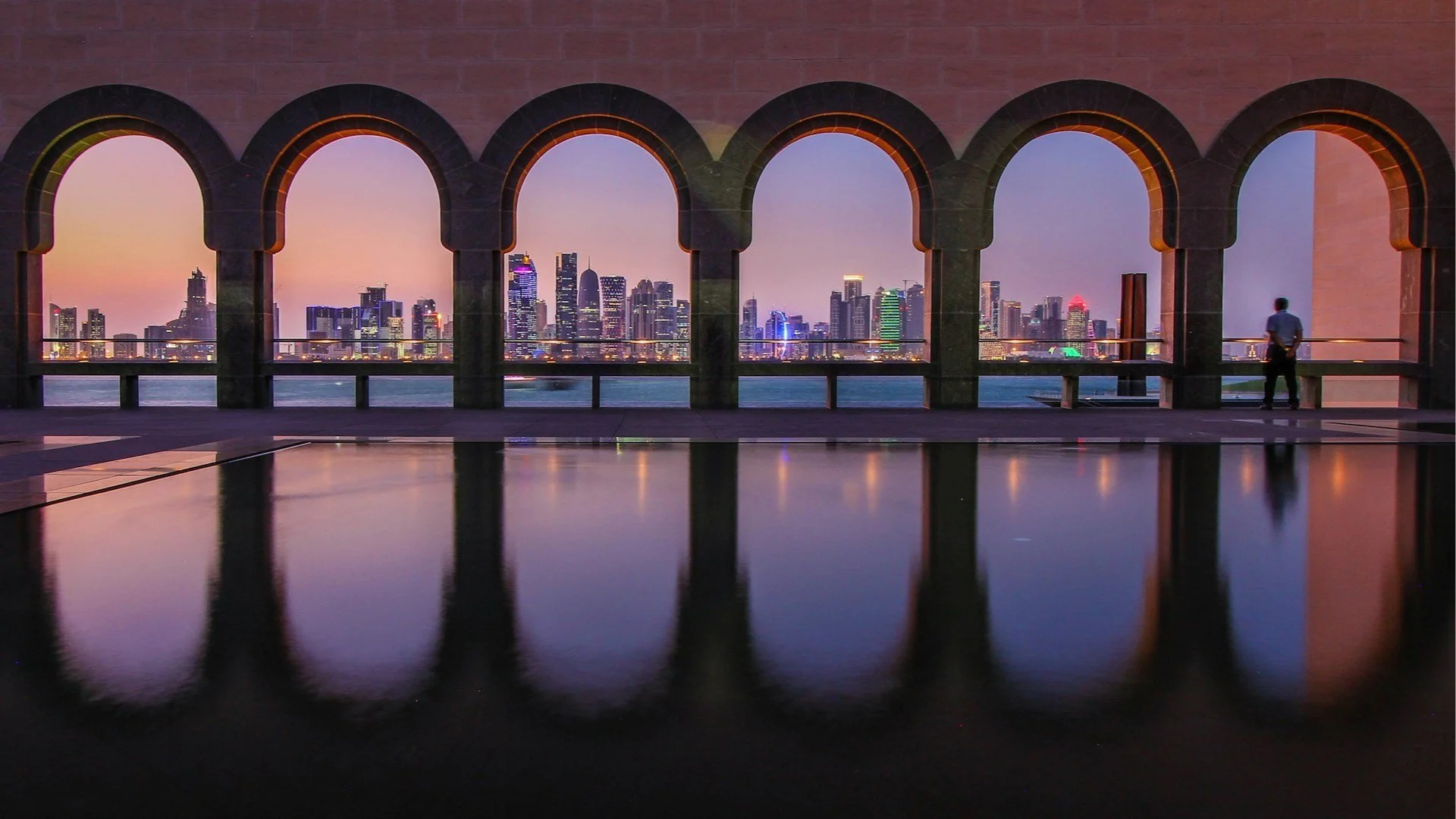Educating Youth for Global Complexity: Building Multilateral Competence
The added imperative of sensible cross-border collaboration in addressing problems of global urgency necessitates a complementing dimension of multilateral training and experience. In other words, tomorrow’s innovators and decision-makers need to also be tomorrow’s diplomats and bridge-builders.
A good example of how learning and international exchange can be meaningfully innovated, is the recently launched Multilateral Junior Academy on Global Challenges (MJA).
Supported by Qatar’s Ministry of Education and Higher Education, UNESCO’s Regional Office in Doha, the German Embassy in Qatar, the Goethe-Institut Gulf Region, and the knowledge platform InStrat, the initiative’s first edition has connected secondary students from Qatar and Germany to specifically explore the shared climate challenge.
A Fragile Truce in Doha
In Doha’s mirrored halls, far from the dust and misery of eastern Congo, two men shook hands this weekend. One represented the Democratic Republic of Congo; the other, the M23 rebel group that has seized cities, airports, and thousands of lives. They signed a Declaration of Principles, pledging to halt attacks, refrain from hate propaganda, and stop seizing new territory.
On paper, it is progress. A final peace agreement is promised by August 18, with initial steps by July 29. Qatar, which spent months quietly mediating since April, is being praised by the African Union as delivering a “milestone.”
But Congo has seen this before.
Qatar and the United States: The Twin Engines of Gaza Diplomacy
In the relentless churn of Middle East diplomacy, the latest attempt to broker a ceasefire in Gaza stands out for the unprecedented synergy between Qatar and the United States. Over the past 48 hours, these two actors have intensified their efforts, employing distinct yet complementary forms of leverage to coax both Israel and Hamas toward a fragile truce. The stakes are immense: the humanitarian crisis in Gaza is reaching catastrophic proportions, and the political calculus for all parties is fraught with risk. This analysis explores the evolving roles of Qatar and the US, the formidable obstacles in the path to peace, and why—despite daunting odds—there is cautious reason to believe that this diplomatic partnership could yield tangible progress. Optimism is warranted, but it must be tempered by realism about the pitfalls that could still derail the process.
Doha Can Take It!
While comparisons between Iran’s recent attack on Qatar’s Al Udeid air base and hellscapes created for entertainment are of course inappropriate, the Gulf state’s ability to keep calm and carry on was nevertheless intriguing. As the country’s air defenses sprang into life Doha’s shops and restaurants initially remained open, many delivery drivers stayed on the road, and people stopped to observe the unfolding drama in the skies. And then things got back to normal.
Multilateral Junior Academy on Global Challenges kicked off in Doha
Dr. Frank Himpel, Professor for Logistics at Germany’s Anhalt University of Applied Sciences and Director of its Institute for Logistics, alongside Dr. Rafah Alarrouqi, Qatar-based Visiting Fellow at the Institute for Logistics, kicked off the Multilateral Junior Academy on Global Challenges (MJA), with its first session hosted at the German International School in Doha.
The international youth dialogue initiative, supported by UNESCO’s regional office in Doha, the German Embassy Doha, the Goethe-Institut Gulf region, and the international expert platform InStrat, brought together more than thirty young students from Tariq Bin Ziyad Secondary School for Boys and Hassan Bin Thabit Secondary School for Boys in a highly engaging, interactive workshop.
Fostering close dialogue and exchange of daily life perspectives across countries and cultures, the launch in Qatar revolved around topics of sustainability, water, energy, and the climate. The exercise will be mirrored by partner schools in Germany, with students engaging in parallel discussions and later exchanging outcomes for joint reflection and further exploration.
Taking Off: Qatar’s Strategic Rise in Global Aviation
For Qatar, an important development took place recently as the International Civil Aviation Organization (ICAO), approved the final phase of its own airspace, the Doha Flight Information Region (FIR). Covering the management of air traffic over international waters north of Qatar, this was a critical step towards achieving complete airspace modernization.
Since gaining independence in 1971, Qatar had relied on Bahrain for air navigation. Realizing the limitations of using the Bahrain Flight Information Region (FIR), Doha requested the International Civil Aviation Organization (ICA0) for its own airspace in 2018.
In 2023, the Doha FIR was demarcated and Qatar was finally on its way to air independence. Winning membership of the ICAO for the first time in 2022, Qatar was also elected chair of the ICAO’s Air Transport Committee in 2024. At this time, Qatar Airways operates more than 250 aircraft, connecting 170 destinations across six continents.
Where Are US-Saudi Defence Ties Heading?
The United States and Saudi Arabia have resumed defence talks, which started just days after Riyadh had hosted US and Russian officials to discuss the two countries' diplomatic relations and the Ukraine war, showcasing the Kingdom’s role as an international mediator and its valued status as a major US ally.
Accompanied by top-level delegations, the Saudi Defence Minister Prince Khalid bin Salman and US Defence Secretary Pete Hegseth held extensive consultations for enhancing strategic ties. Emphasising the crucial nature of Saudi-US cooperation, Prince Khalid said that living in a “turbulent region” makes it necessary to coordinate bilateral efforts to “ensure stability in the region and the world.”
Considering the various concerned players and a highly complex political and security situation in the Middle East, InStrat Nonresident Fellow Sabena Siddiqui explores for The New Arab where these talks may be heading, towards a deeper strategic alliance, or indeed a purely interest-driven partnership.
Making Plans for Nigel (…Farage)
Besides renegotiating trading terms with the European Union and freeing the UK from the World Economic Forum and other ‘globalist’ organizations, Reform’s ‘contract’ lacks a clear and coherent foreign policy. This is hardly surprising given populism’s dependence on ‘me first’ narratives. It nevertheless raises questions as to how a Farage premiership will conduct itself on the international stage, particularly with countries that have traditionally factored the UK into their foreign policy calculations.
These include the Gulf Cooperation Council (GCC) states, home to significant expat British populations and business interests. While deciphering a Farage-inspired foreign policy is not an immediate priority, the UK’s fractious political landscape suggests that it is better for GCC to be prepared.
What's Behind Taliban's Decision to Attend UN Conference in Qatar?
Qatar — which is playing a crucial role in engaging with the Taliban and providing them with a meeting place to negotiate with global powers — took on a difficult task considering its relatively small size in the Gulf Cooperation Council. But the effort has paid dividends, with Doha building solid diplomatic credentials at regional and global levels by connecting Afghanistan to third parties.
What Happens in Georgia Matters to the Gulf
Tens of thousands of ordinary Georgians continue to protest the reintroduction of the controversial “foreign influence” bill. Backed by the governing Georgian Dream party, the legislation requires media and non-governmental organizations receiving more than 20% funding from abroad to register as an organization "pursuing the interests of a foreign power". Critics have branded the bill the “Russian law”, warning that similar legislation has been used there to quieten free speech and crackdown on dissent.
Britain’s Upcoming General Election: What it Might Mean for the GCC
Like many parts of the world, the Gulf Cooperation Council (GCC) has more than a passing interest in the current state and future trajectory of British politics. For year ending March 2023, trade between the United Kingdom and GCC countries amounted to £65.2 billion, making the Gulf region the UK’s seventh-largest export market. A UK government report also highlights that GCC Foreign Direct Investment (FDI) holdings in the country amounted to £15.7 billion in 2020. Close economic ties are complemented by positive diplomatic relations and a large expat British workforce in many GCC states.
Minister of Transport Inaugurates International Autonomous e-Mobility Forum
Doha, Qatar: Minister of Transport HE Jassim bin Saif Al Sulaiti inaugurated the Autonomous e-Mobility Forum on Tuesday, hosted by the Ministry of Transport at the Qatar National Convention Center (QNCC) for two days.
The opening ceremony was attended by a number of Their Excellencies Ministers, high-profile state officials, and chairpersons of entities working in the transportation industry.
In his opening speech, HE Minister of Transport stressed that Qatar, under the wise leadership of HH the Amir Sheikh Tamim bin Hamad Al-Thani, will continue developing a coherent, sustainable, integrated, and eco-friendly transportation system in a fashion that enhances the country’s leading position on the world map of green and smart transportation, in addition to sharing its expertise in the field with the rest of the world through its real-life experiences of hosting major continental and international events, where transportation is a key success factor.
Region’s Affinity to Technology and Innovation is Key
Earlier this year, H E Lothar Freischlader, Germany’s Ambassador to the State of Qatar and Thomas Triller, Deputy Head of Mission responsible for economic affairs, met for a talk with representatives of the Autonomous e-Mobility Forum’s Executive Committee. Providing the perspective of a leading technology exporter and traditional automotive nation, the diplomats shared their observations and views on Qatar’s trajectory as a hub for dialogue, Qatari-German relations, global collaboration for a common good, and the potentials of autonomous e-mobility going forward. The German embassy indeed is the first diplomatic representation in Doha to utilize an electric vehicle as a staff car.
Can Innovation Diplomacy End the Climate Gamble?
With today’s global challenges urging equally global responses, an overlooked subset of diplomacy emerges as potentially pivotal: innovation diplomacy, a discipline related to the overarching concept of science diplomacy. Characterized by particularly collaborative prerequisites, science diplomacy, though lacking a precise definition, is usually understood across three dimensions, which could work similarly for innovation diplomacy:














